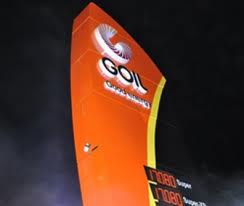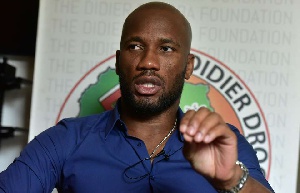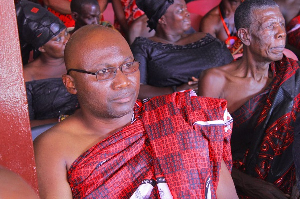- Home - News
- TWI News | TV
- Polls
- Year In Review
- News Archive
- Crime & Punishment
- Politics
- Regional
- Editorial
- Health
- Ghanaians Abroad
- Tabloid
- Africa
- Religion
- Election 2020
- Coronavirus
- News Videos | TV
- Photo Archives
- News Headlines
- Press Release
Business News of Wednesday, 4 November 2015
Source: GNA
GOIL takes control of downstream oil marketing
 GOIL logo
GOIL logo
Downstream oil marketing pricing has taken a dramatic turn as Ghana Oil Company Limited (GOIL) is dictating the deregulated regime with lower prices as compared to other major competitors.
A Ghana News Agency team monitoring the fortnight price review in accordance with the petroleum deregulation regime observed that GOIL the only indigenous downstream oil marketing company in the country quoted GH¢2.673 per litre for Super XP and GH¢2.666 per litre for Diesel XP.
NASONA Oil Company Limited is quoting GH¢2.750 per litre for Super and GH¢2.720 per litre for Diesel; and STAR Oil Company Limited has pegged its prices at GH¢2.795 per litre for Super and GH¢2.725 per litre for Diesel.
Petrobay Oil Company Limited is selling Super at GH¢2.770 per litre and Diesel at GH¢2.690 per litre; SO Energy Ghana Limited has pegged the price of super at GH¢2.800 and diesel at GH¢2.723 per litre; and Glory Oil Company Limited is quoting GH¢2.760 per litre for Super and GH¢2.670 per litre for Diesel.
ENGEN Ghana Limited and Allied Oil Company Limited are all quoting GH¢2.820 per litre for Super and GH¢2.730 per litre for Diesel; whilst Frimps Oil Company Limited is selling at GH¢2.771 per litre for Super and GH¢2.700 per litre for Diesel.
Total Petroleum Company Limited and Shell Petroleum Company Limited have also pegged the price at GH¢2.673 per litre for Super and GH¢2.666 per litre for Diesel.
Champion Oil Company Limited is selling at GH¢2.760 per litre for Super and GH¢2.700 per litre for Diesel; whilst African Petroleum is quoting GH¢2.799 per litre for Super and GH¢2.720 per litre for Diesel.
Other Oil Marketing Companies EV Oil Company Limited, Benab Oil Company Limited, UBI Petroleum Ghana Limited, and Universal Oil Company Limited are all quoting very competitive prices for the products.
The prices review of petroleum products is in conformity with the de-regulation of petroleum products, which took effect from June 16.
The reduction was attributed to the marginal stabilisation of the local currency, the cedi, to other major currencies and the world crude oil price during the sixth de-regulated pricing regime for the period.
The government has decided to wash its hands off the pricing of petroleum products.
This means that the Bulk Oil Distribution Companies (BDCs) and Oil Marketing Companies (OMCs) will price their own products.
The strategy, which is the final phase of Ghana’s petroleum downstream deregulation policy, will result in the cessation of subsidies on fuel products.










